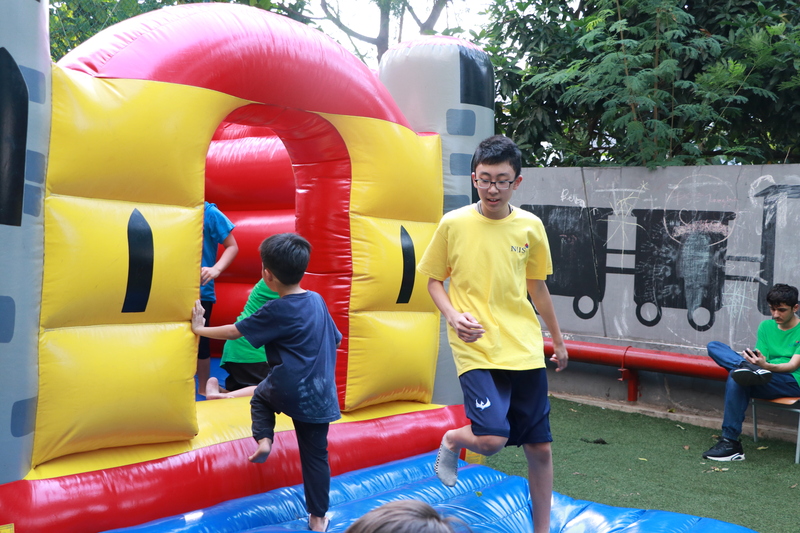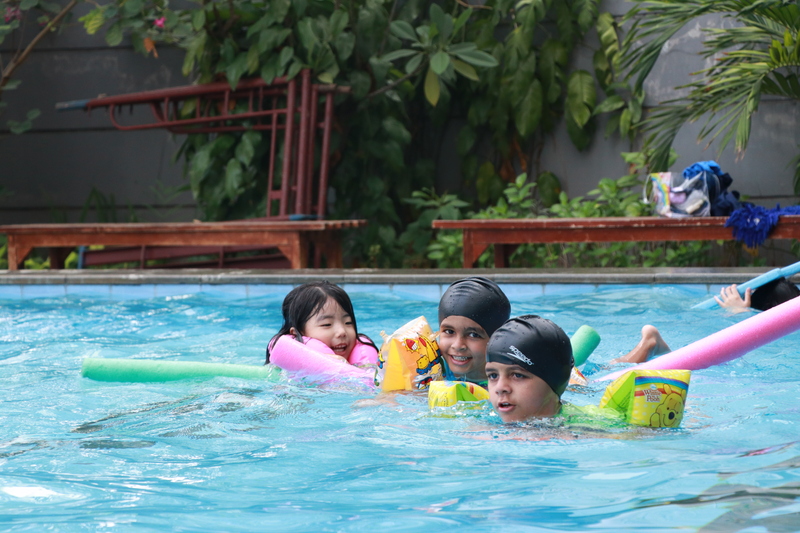The school’s brand-new initiative aims to mould children of all ages into becoming independent thinkers.
On 15th February, Indonesia Expat visited North Jakarta Intercultural School (NJIS) and received a warm welcome from Ezra Alexander, the new Head of School for the academic year 2024–2025. In a profound and delightful conversation, Alexander discussed the school’s brand-new initiative called Let Grow Play Club which aims to promote physical exercise among the students while also moulding them into becoming independent thinkers. Ezra also shared how his experience growing up in a small town in British Columbia, Canada helped inspire the Let Grow Play Club and why it is important to have students learn how to balance autonomy with responsibility.
Hi, Ezra. Thank you very much for having me here. Can you share more details about Let Grow Play Club at NJIS and its goals?
I’m going to start with how the whole movement started in the first place. There was this columnist – and mother – named Lenore Skenazy who noticed how children have become less independent. She later let her fourth-grade child ride the New York subway on his own. She wrote about it in her column and ended up receiving a lot of backlash from concerned citizens and other parents, like, “How could you let your child wander off like that?” And that got her thinking about how society, over the years and the generations, has changed when it comes to treating children and what we can do to get our children’s independence back.
I am a parent as well as a teacher. Upon reflecting on my childhood and what my children are doing now, I could totally see how sheltered our children are becoming. Thus, what can we do to retrieve our children’s independence – something I would also like to call “student’ agency”? And that is how Let Grow Play Club at NJIS started.
Let Grow Play Club is an unstructured program in which the children can play. Of course, there are adult supervisors to oversee things; for instance, to check if the children are getting hurt. Nonetheless, it is the children who decide which activities they want to do and how they want to organise the games. They are also free to engage in conflicts and arguments and, subsequently, learn how to resolve them for themselves – all of which are carried on without adults stepping in. These interactions cultivate a set of life skills that the children will need at some point in the future.
How does Let Grow Play Club align with NJIS’s educational philosophy?
If you think about what children are doing today, a lot of it is adult-directed activity. Whatever the activity might be – sports, dance class, Mandarin lessons, just to name a few – there is usually little input from the children. Even when they have free time, the children are often glued to the screen, be it either a television screen or a mobile device. I remember when I was my students’ age, I would be out of the door as soon as the sun was up and I would be back in at dinner time.
With Let Grow Play Club, we are teaching our students to become independent thinkers. We also want to model the 21st-century skills that we want them to develop. Yes, we could explicitly teach these skills and model the behaviours, but what is vital is for the students to learn by doing. Here at NJIS, we often emphasise mastery, autonomy and purpose. When children have that autonomy and purpose – or, the freedom to choose what they want to do – the resulting motivation and drive is so much greater.
How does Let Grow Play Club contribute to the development of children’s creativity and confidence?
With Let Grow Play Club, we put the power and ownership in the children’s hands. That means they need to rely on themselves more, which is an extension of other things that we have been doing here at NJIS. We assign something called the “Let Grow Challenge” each month. Students are tasked to do something at home without their parents’ or their nannies’ supervision. It could be household chores like cleaning the table by themselves or deciding to cook meals on their own.
How does Let Grow Play Club help children learn social skills, focus, communication, and imagination through organising their own games?
I grew up with organised sports. They are definitely important, but, back then, most of them were like, “Hurry up and wait! Okay, line up now!” However, when the students are the ones organising their games during Let Grow Play Club, they usually move their bodies, non-stop. There is bound to be an argument among the students, but they are also encouraged to learn how to go through any possible discourse and move on. Another beautiful thing about Let Grow Play Club is how students of all ages get to come together as well. The older children are able to coach the younger children as well.
Mastering certain skills requires time and practice. Being able to think for yourself is not something that you can master at the snap of your finger. You need to practice that and Let Grow Play Club is a great place to do so. Now, Let Grow Play Club can run on its own, yet it is still building up steam. The students always come up with new and creative things to do.
How does Let Grow Play Club encourage physical exercise, and how does it compare to organised sports in terms of physical activity?
In organised sports, there is a lot of watching and listening to instructions. When the children are not restricted to instructions, however, they get to move their bodies, non-stop. If you take time to watch how children move, you will realise that they never walk – they always run from one place to another without even thinking about it. Parents tend to inhibit their children’s desire to move and explore. Now that the children get to do what they want to do in Let Grow Play Club, a lot of times, they prefer to just move around for the whole hour.
Ultimately, Let Grow Play Club is not a matter of encouraging physical exercise; it is about giving the children the freedom to choose what they want to do – and they naturally gravitate towards physical activities. Having said that, if a child decides not to engage in any physical activity, that is okay as well – because they are still learning and observing what goes on around them. At some point, they will notice something that might spark their interest and decide to explore it.
How does Let Grow Play Club ensure that children are off electronic devices (such as mobile devices and tablets) during their participation?
It is pretty easy, actually. We simply ask the children not to take any electronic device with them and there has been no problem. This might sound a bit contradictory, but children still need to be told about limits. When I talk about students’ agency and ownership, it does not mean that they get to stay up late at home. It does not mean they get to eat candies for every meal. As teachers, parents and adults, we still have the responsibility to raise children and mould healthy habits in them. An electronic device is not something with which children can toy around whenever they want because they could end up missing out on other activities. Think about when you go to a restaurant and you see a table full of diners who are glued to their respective mobile device. You cannot help but wonder, “How will they get to know each other?” It’s a matter of moderation.
Can you share one interesting or notable experience from the children who have participated in Let Grow Play Club so far?
My children happen to be enrolled at NJIS. After their school activities, they would usually head towards my office and spend time with their mobile devices. When I asked my children to participate in Let Grow Play Club, they were almost in tears because they would not be allowed to bring their mobile devices. During the first week, my son simply sat on a bench and read. Now, though, he enjoys participating in Let Grow Play Club by playing football in the sports cage and comes back drenched in sweat. Let Grow Play Club is also my daughter’s favourite after-school activity now. She made new friends from different grades, and the interactions between children of different ages got her really excited with Let Grow Play Club.
Sometimes, on Fridays, we invite the students’ families to come and spend some time at Let Grow Play Club. We would prepare some helpful tools and facilities, such as a bouncy castle and the school’s swimming pool, and we would ask them, “Alright, what do you guys want to do?”




